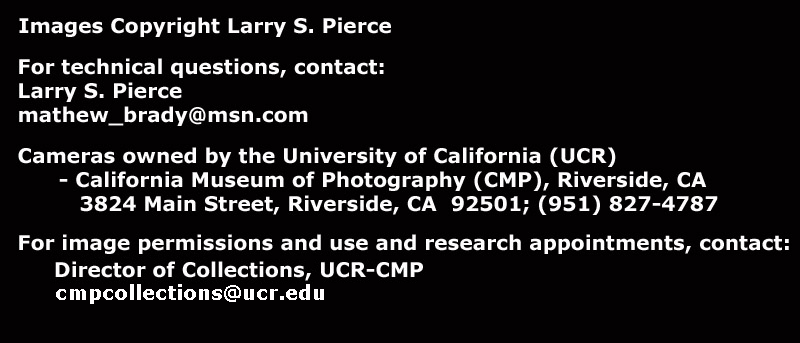Rochester Optical Co., Rochester, NY
New Model Camera Variation 2.0
8 x 10
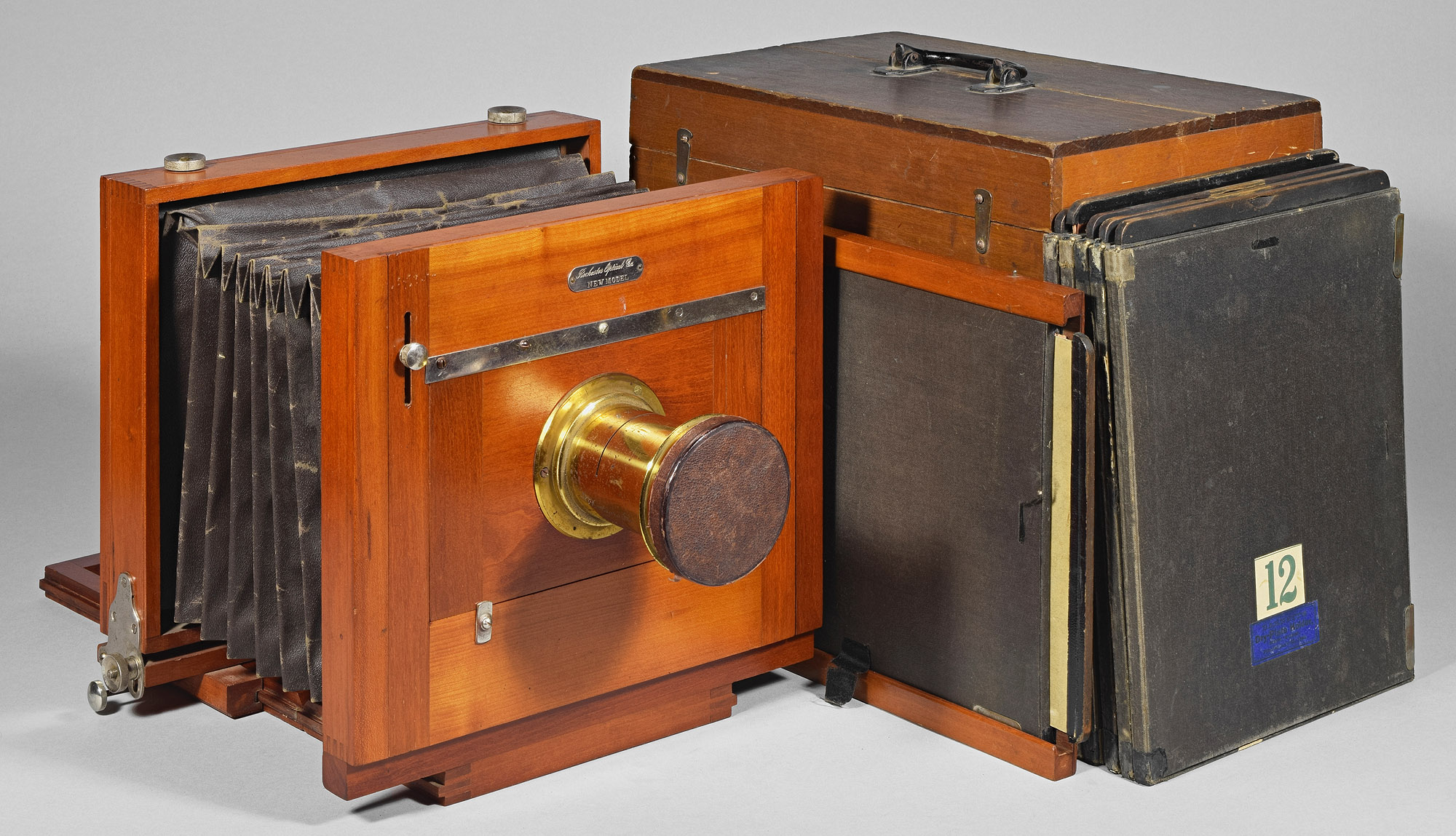
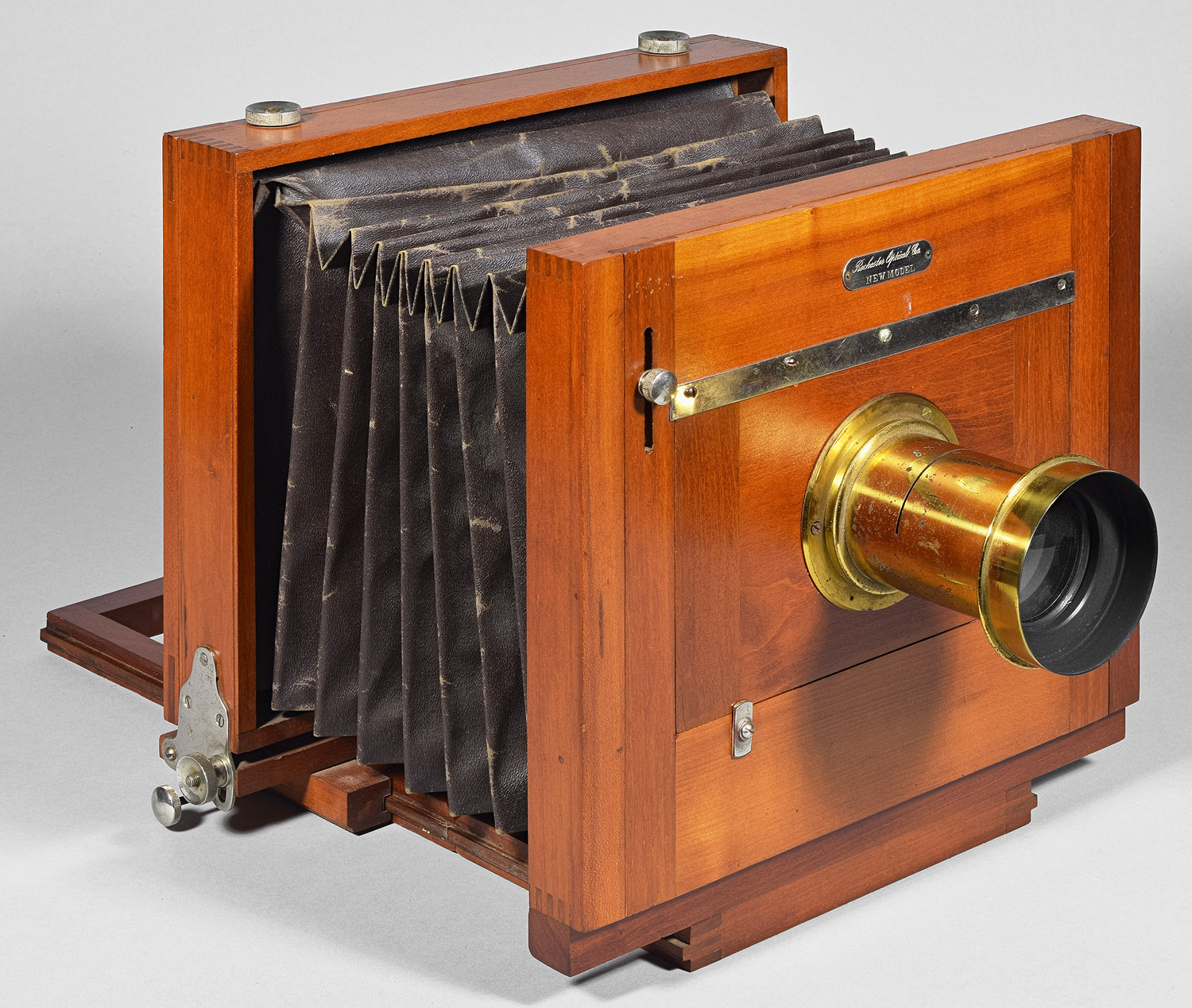
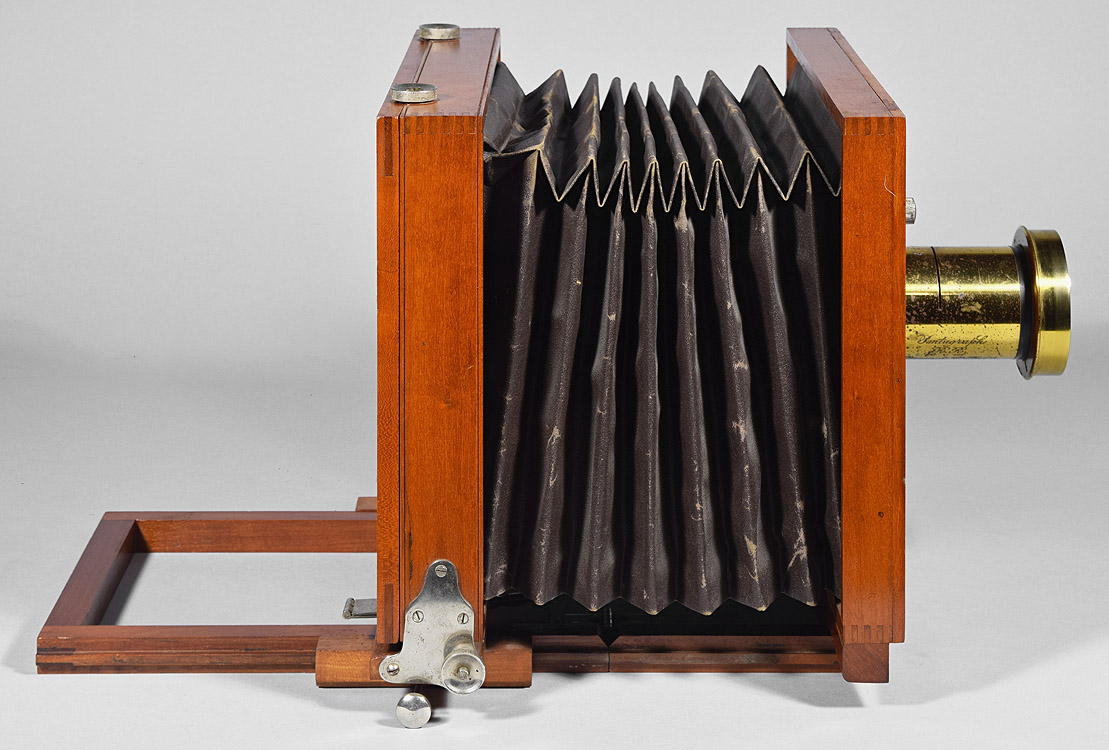
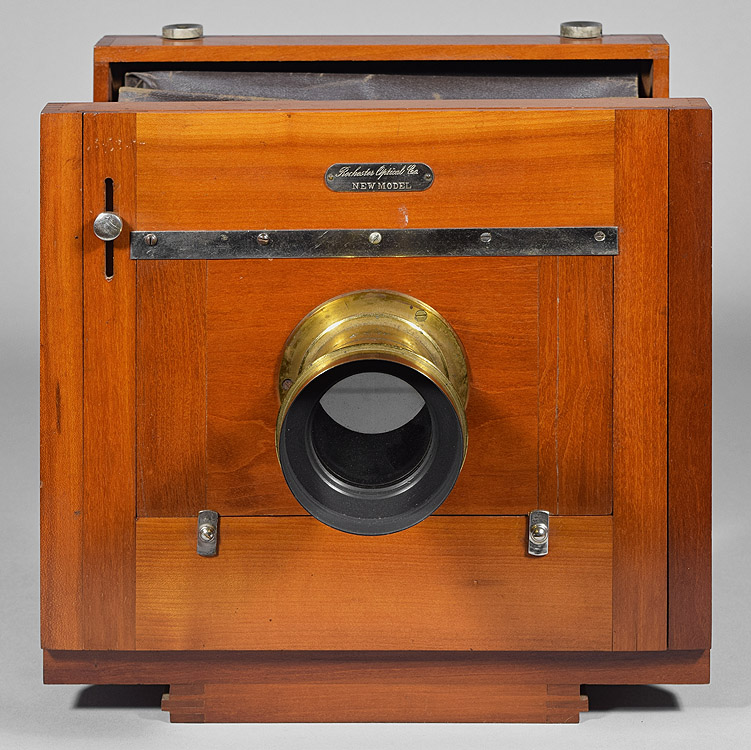
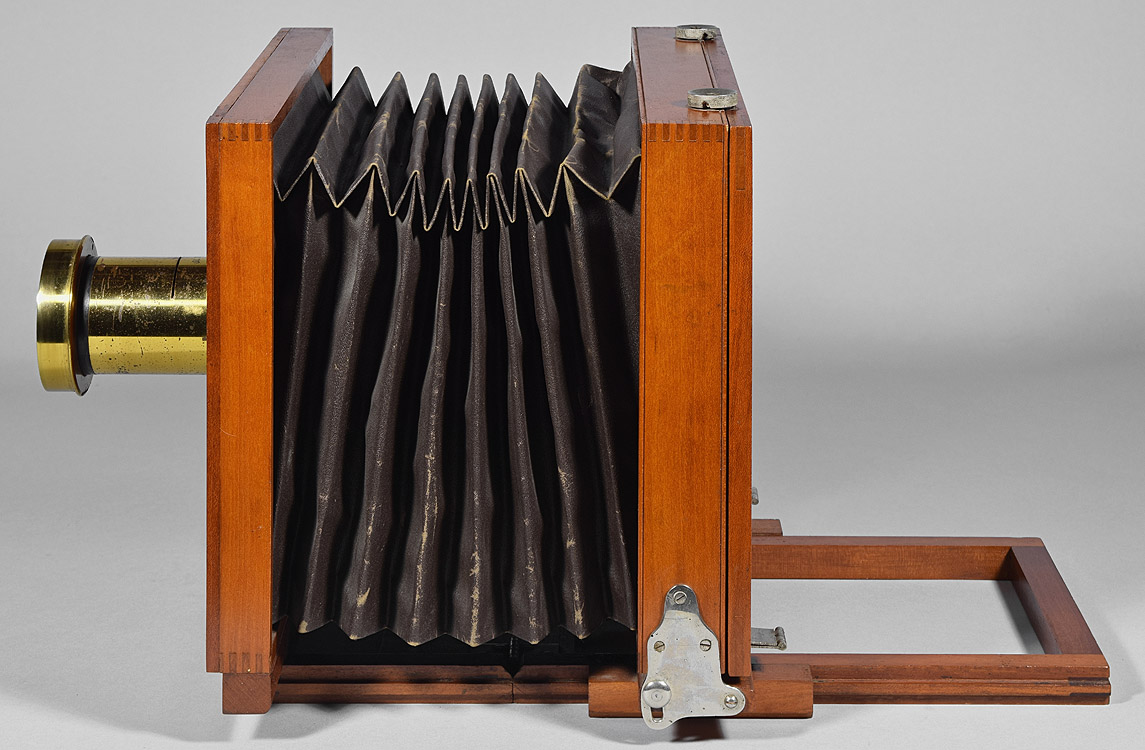
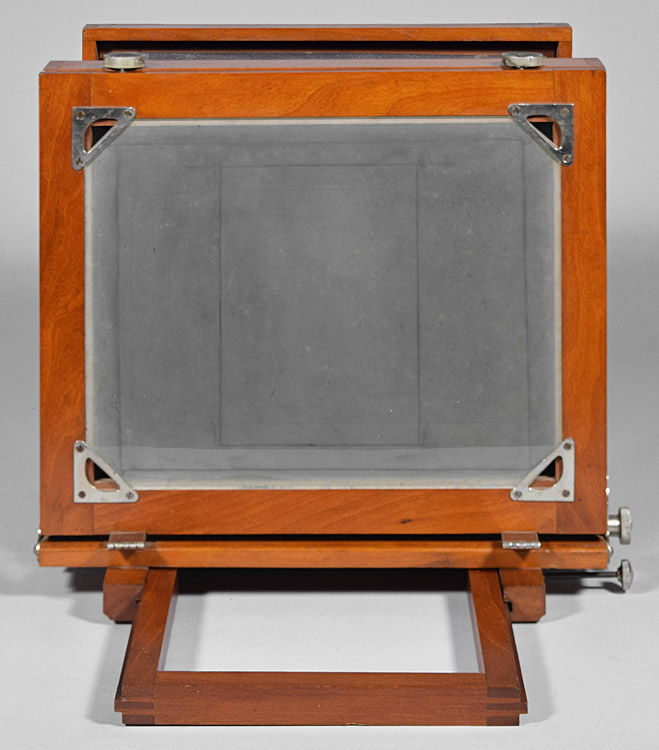
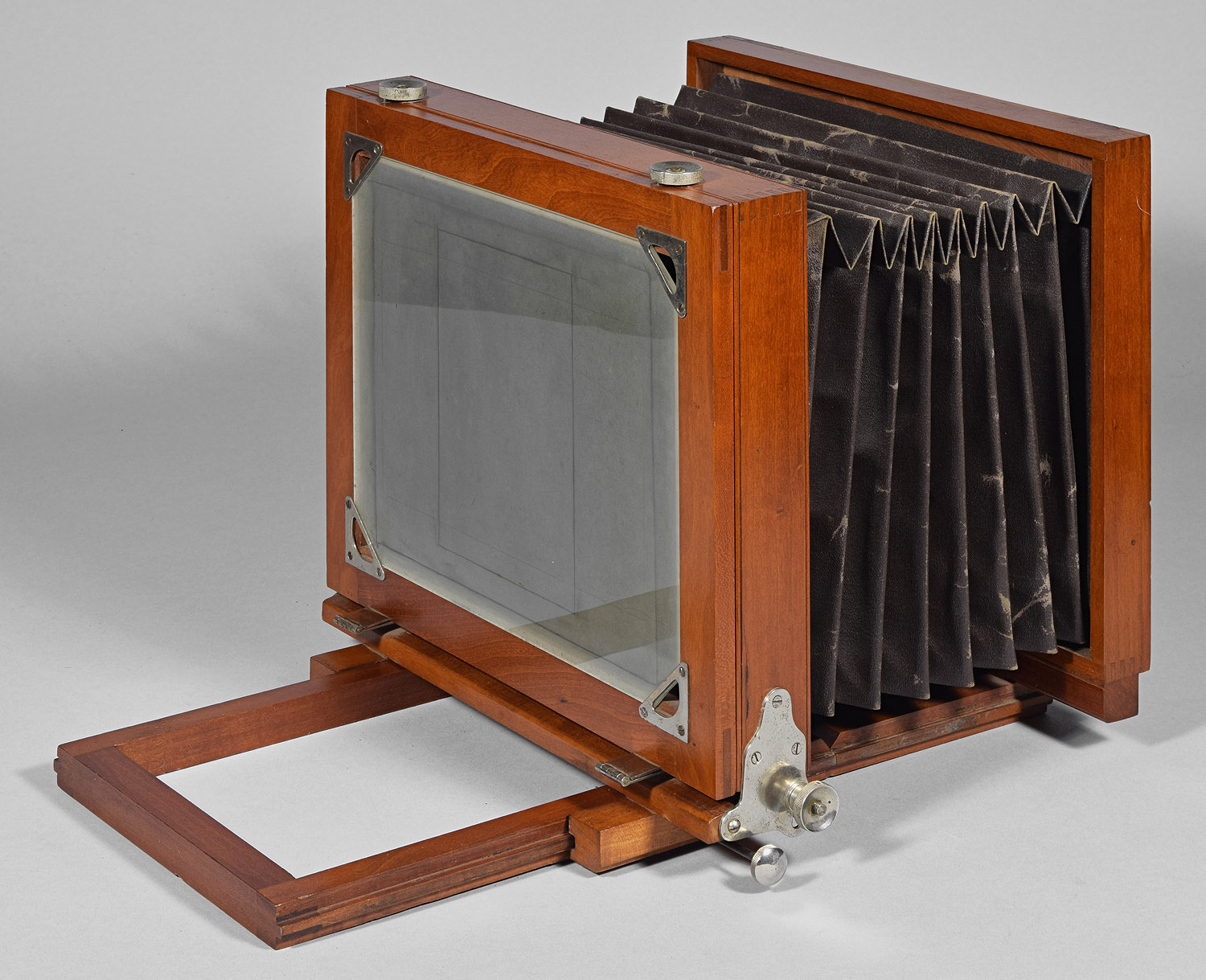
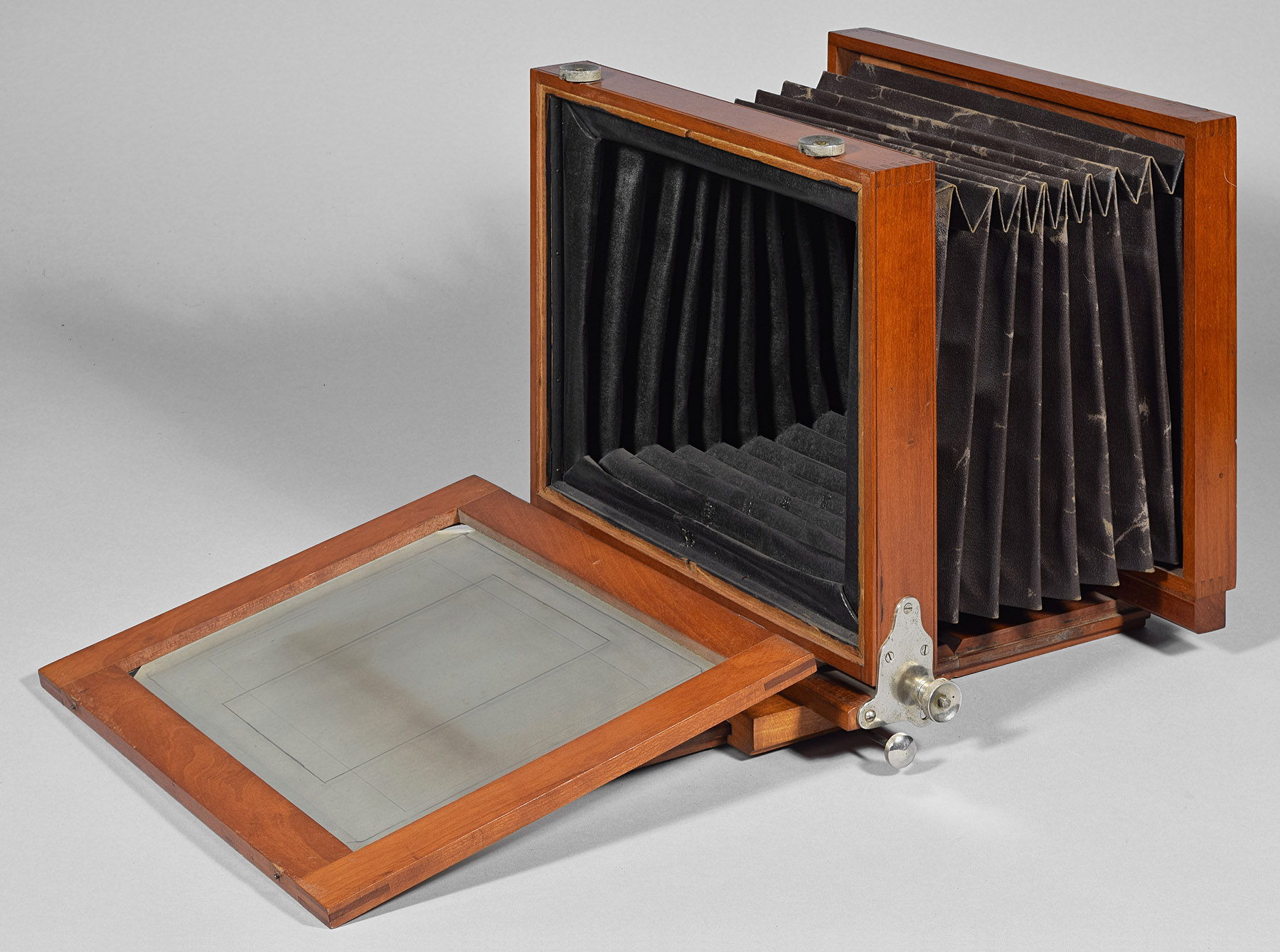
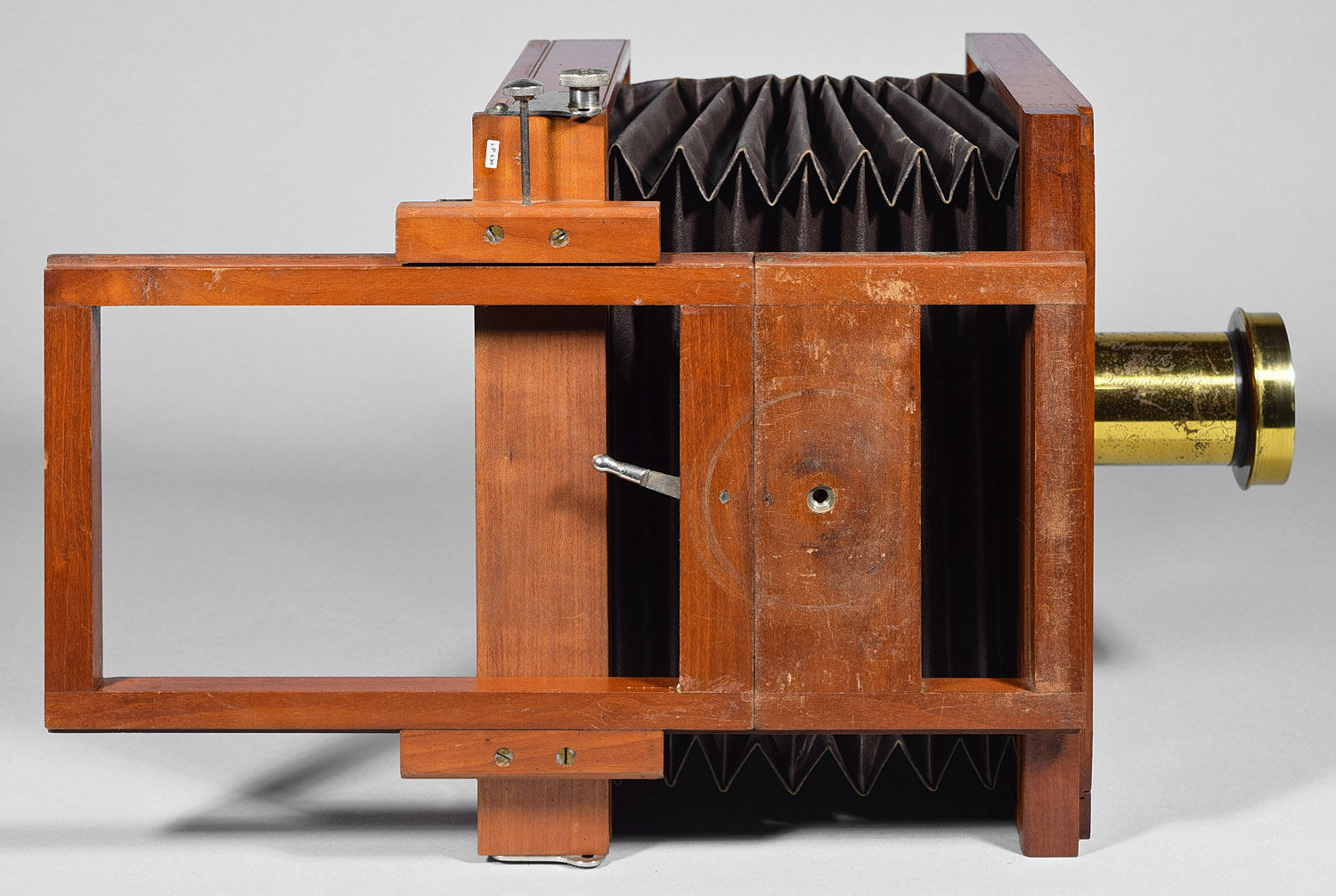
Label, Ni-plated brass,
upper part of the front standard: "Rochester Optical Co. - New Model" Assembly numbers: Stamp on the outside
top of the camera case: "Rochester Optical Co." Ink stamp on the inside of the top of the camera case:
"New Model - Single Swing".
Barnett's plate holder
system. Labels on a
Barnett plate holder:
Date Introduced: - ;
Years Manufactured: c.
1886 The New Model is a
Rochester Optical's least simplest and least expensive model - a basic
back focus view camera having non-tapering leatherette (coated paper
textured to look like leather) bellows and push-pull focus. The
wood used was stated to be cherry, and the hardware was stated to be
nickel (-plated brass). The Rochester Optical Catalog of
Photographic Apparatus, June 1890, states that the New Model has
been on the market for six years, and Photographic Apparatus, Rochester
Optical & Camera Co., 1896 states that the New Model has been on the
market for twelve years. Therefore introduced about 1884, it is
likely that the
December 15, 1883 Scientific American advertisement, which has a
small but recognizable engraving of the 4x5 model, is the first mention
of the model. It is an inexpensive camera that was popular over a
wide range of years, so it is not surprising that a number of variations
were made. Variations of the ROC New Model:
New Model Variation 1: Hardware: Nickel-plated brass. Bed: The
earliest engravings of the New Model, here called Variation 1,
have bed edges that are beveled. This is the most distinctive
feature of Variation 1, as all other variations have bed edges
that form a shallow tongue & groove joint with the sliding back
standard. Variation 1 also has solid wood between its
edges, a trait it shares with only Variation 1.3. The 1886
Queen & Co. catalog entry states: all sizes above 4x5" have folding
bed for compactness, implying that sizes 4x5 and smaller have
non-folding beds. Indeed, examples of the 4x5 size do not fold,
and examples of the 5x8 size fold. A folding bed is made rigid by
a cast metal swivel piece attached to the middle of the bed (see
cast metal detail photo). Lens Board:
Examples greater than 4x5" version of Variation 1 have a removable lens
board; the 4x5 size (and presumably the 3 ½x4 ½) has a fixed front
surface without provision for lens board. Furthermore, the surface
onto which the lens is affixed is contoured to precisely fit the 4x5
Rochester Optical Single Achromat lens, which came with the camera. Bellows: Thin red fabric. The
thin fabric type of bellows are often found slightly collapsed on their
top section. Rise Slot:
The rise slot of the Variation 1 is bare rather than having a
wear shield, as do some of the later variations. Label: Nickel-plated brass, round or
square ends. Ground Glass Frame:
Variation 1, Variation 1.3, and Variation 1.5 have a thin-type frame,
rather than the thick-type frame that later Variations have (see
thin-thick frame detail photos). This variation has tiny and elegant
quarter-round moldings that hold the ground glass in place. Ground Glass Frame
Fastener: The fastener that holds the frame up is the typical
small, round, spring-loaded Rochester catch at the center back; a notch
in a lever engages a brad on the ground glass frame to hold; an interior
spring keeps the notch against the brad. Serial or Assembly Number: Assembly
numbers (LP415=No.s26 and 120, LP1030=No. 66, LP465=None) A 5x8" New Model that looks otherwise like
a Variation 1 that is on display at the website of the George
Eastman House (http://www.geh.org/fm/mees/htmlsrc/mR676600002_ful.html)
has some detailing (apparently decorative) on its front edge that other
Variation 1 examples do not. This might represent an
earlier variation than Variation 1.
New Model Variation 1.3 (introduction of the tongue &
groove-edged bed): Hardware: Nickel-plated brass continues. Bed: This
variation is transitional between
New Model
Variation 1 and
New Model
Variation 1.5 in that it retains the top-mounted, cast metal
swivel to make the bed rigid as found on Variation 1, and also
the solid
wood bed, but has the tongue & groove-edged bed as found on
Variations 1.5 and later. Lens Board:
Removable lens board. Bellows: Thin brown fabric. The
thin fabric type of bellows are often found slightly collapsed on their
top section. Rise Slot: The
rise slot does not have a metal wear shield. Label: Nickel-plated brass, round ends. Ground Glass Frame:
As in Variation 1: the thin-type frame, and the tiny and elegant
quarter-round moldings to hold the ground glass in place. Ground Glass Frame
Fastener: Small, round spring-type fastener. Serial or Assembly Number: LP1019=None,
LP1212=None.
New Model Variation 1.5 (introduction of a metal wear
shield for the rise slot): Hardware: Nickel-plated brass continues. Bed: This
variation appears to be transitional between
New Model
Variation 1.3 and
New Model
Variation 2 in that it retains the top-mounted, cast metal
swivel to make the bed rigid as found on Variations 1 and 1.3,
but has a frame-type, tongue & groove-edged bed instead of a
solid-filled bed. The solid bed used for Variations 1
and 1.3 undoubtedly used considerably more wood than a frame. It
would also seem that the wood used in a solid bed would have had to be
very well seasoned, to prevent warping, whereas the multiple pieces used
in a frame would offset any warping from any one of them.
Lens Board:
All sizes now have removable lens boards. Bellows: Thin reddish brown fabric.
The thin fabric type of bellows are often found slightly collapsed on
their top section. Rise Slot: The
rise slot of Variation 1.5 is surrounded by a rounded metal wear
shield. This is the only variation that has such a shield;
however, the
Commodore
Variation 1 and
Commodore
Variation 2 (i.e., all Commodores) have the shield on
their rise and also their shift. Label: Nickel-plated brass, square
ends. Ground Glass Frame:
As in Variation 1: the thin-type frame, with tiny and elegant
quarter-round moldings to hold the ground glass in place. Ground Glass Frame
Fastener: Small, round spring-type fastener. Serial or Assembly Number: LP790=None.
New Model Variation 2 (introduction of the thick frame
holding the ground glass at the corners using metal pieces, and cam-type
ground glass frame clips): Hardware: Nickel-plated brass continues. Bed: Variation 2
continues the use of a frame-type bed having tongue & groove edges.
But instead of the cast metal swivel to make the bed rigid on
Variation 1 though Variation 1.5, this variation introduces a
lever that fits through a slot in the fixed part of the bed to hook a
post, which connects the two parts of the bed tightly together.
When new, the lever system probably functioned well, but the slotted bed
is weak and is often found to be fractured now. Lens Board:
Removable lens boards continue. Bellows: Thin brown fabric. The
thin fabric type of bellows are often found slightly collapsed on their
top section. Rise Slot:
The rise slot switches back to being bare. Label: Nickel-plated brass, round ends. Ground Glass Frame:
Introduction of the thick-type frame (see comparison on the Variation 1
page. The ground glass is held at its corners by four flat metal
pieces. Ground Glass Frame
Fastener: The most distinguishing feature of a New
Model Variation 2 is the presence of large, round clips on the top
of the camera to retain the ground glass frame that is hinged at the
bottom. To tighten, the clip is rotated to a position to admit a
brad, then rotated clockwise to tighten via a cam-like action. Up
to six of this type of clip was also used on the
Ideal
Variation 1, undoubtedly produced at the same time. The
use of these cam-type clips must have been short-lived. Variation
1, Variation 1.5 and also Variation 3 retain the hinged ground glass
frame using the classic Rochester Optical clips - small, round, and
worked by a spring instead of a cam. Thus, the cam-type clips were
an experiment, perhaps too expensive to continue, since the company went
back to their previous type of clip after a relatively few such cameras
were made. Variation 2 is also the first appearance of the
thick-type ground glass frame. Variation 2 also marks
the first appearance of triangular corner hardware to hold the ground
glass in its frame, rather than brads, as were used in thin-type frame
models. Serial or Assembly Number: LP434=No.s 3
and 4.
New Model Variation 2.1 (minor change from Variation 2): Hardware: Nickel-plated brass continues. Bed: Same as Variation 2:
the frame-type bed having tongue & groove edges,
lever and post to make the bed rigid. Lens Board:
Removable lens boards continue. Bellows: Thick black fabric instead of
the thin fabric- no sign of collapse, but these might be replacement
bellows, considering the continuation of brown bellows for the remainder
of the variations. Rise Slot:
Still bare like Variation 2. Label: Celluloid with square ends,
indicating model, manufacturer, and location of company. Ground Glass Frame:
Continues thick-type frame (see comparison on the Variation 1
page), and ground glass held at its corners by four triangular,
frame-like, flat metal
pieces. Ground Glass Frame
Fastener: Continuing the use of the large, round
cam-type clips on the top
of the camera to retain the ground glass frame that is hinged at the
bottom. Serial or Assembly Number: LP1268=Full
Serial No. 16545 located on the inside of the ground glass frame.
First instance of a full serial number rather than assembly numbers or
no numbers.
New Model Variation 2.5 (thick frame combined with metal front label and metal
guard for the front standard rise slot): Hardware:
nickel-plated brass continues. Bed: Variation 2
continues the use of a frame-type bed having tongue & groove edges.
Also continues the
lever and post system that connects the two parts of the bed tightly together. Lens Board:
Removable lens boards continue. Bellows: Brown fabric showing no
evidence of collapse at the top - must be thicker than Variation 2
and earlier bellows. Rise Slot:
The rise slot again has a metal wear shield. Label: Nickel-plated brass, round ends. Ground Glass Frame:
Continues the thick frame and ground glass held at its corners by four flat metal
pieces. Ground Glass Frame
Fastener: The cam-type fasteners have been discontinued,
going back to the round, spring loaded, classic ROC clip. Serial or Assembly Number:
LP157:=probably none.
New Model Variation 3 : Wood, Hardware: Same as Variation 2. Bed: Variation 2
continues the use of a frame-type bed having tongue & groove edges.
Also continues the
lever and post system that connects the two parts of the bed tightly together. Lens Board:
Removable lens boards continue. Bellows: Brown fabric showing no
evidence of collapse at the top - same as Variation 2.5. Rise Slot:
The rise slot does not have a metal wear shield. Label: Celluloid (like Variation
2.1) Ground Glass Frame:
Same as Variation 2 - continuing the thick-type frame, and flat metal hardware holding the ground glass
at its corners. Ground Glass Frame
Fastener: Small, round, spring-type. Serial or Assembly Number: LP108=No.
27, LP=None.
New Model Variation 4.0 (lacquered brass
hardware rather than nickel plated hardware): Wood: Same as Variation 2. Hardware: First instance of lacquered brass
instead of nickel-plated. Bed: Variation 2
continues the use of a frame-type bed having tongue & groove edges.
Also continues the
lever and post system that connects the two parts of the bed tightly together. Lens Board:
Removable lens boards continue. Bellows: Black fabric showing no
evidence of collapse at the top. Rise Slot:
The rise slot does not have a metal wear shield. Label: Celluloid (like Variation
2.1) Ground Glass Frame:
Same as Variation 2 - continuing the thick-type frame, and flat metal hardware holding the ground glass
at its corners. Ground Glass Frame
Fastener: Small, round, spring-type. Serial or Assembly Number: LP108=No.
27, LP=None. References:
Back to Rochester Optical Group of Manufacturers

"3" on the left side of the rear standard surface under the swinging
box. It is normally hidden by the hinged ground glass frame.
It is next to one of the metal pegs that hold a plate holder when it is
installed.
"4" on the inside lower part of the ground glass frame (upside down from
this viewpoint).



This is a system designed to reduce the space required to store
loaded plate holders during a photographic excursion. The cherry
holder fits the Rochester Optical camera back. Each black part is
relatively thin, and consists of one loaded plate and a dark slide.
This accessory is extremely rare - apparently photographers realized
that it takes up about the same space as the usually double holders.
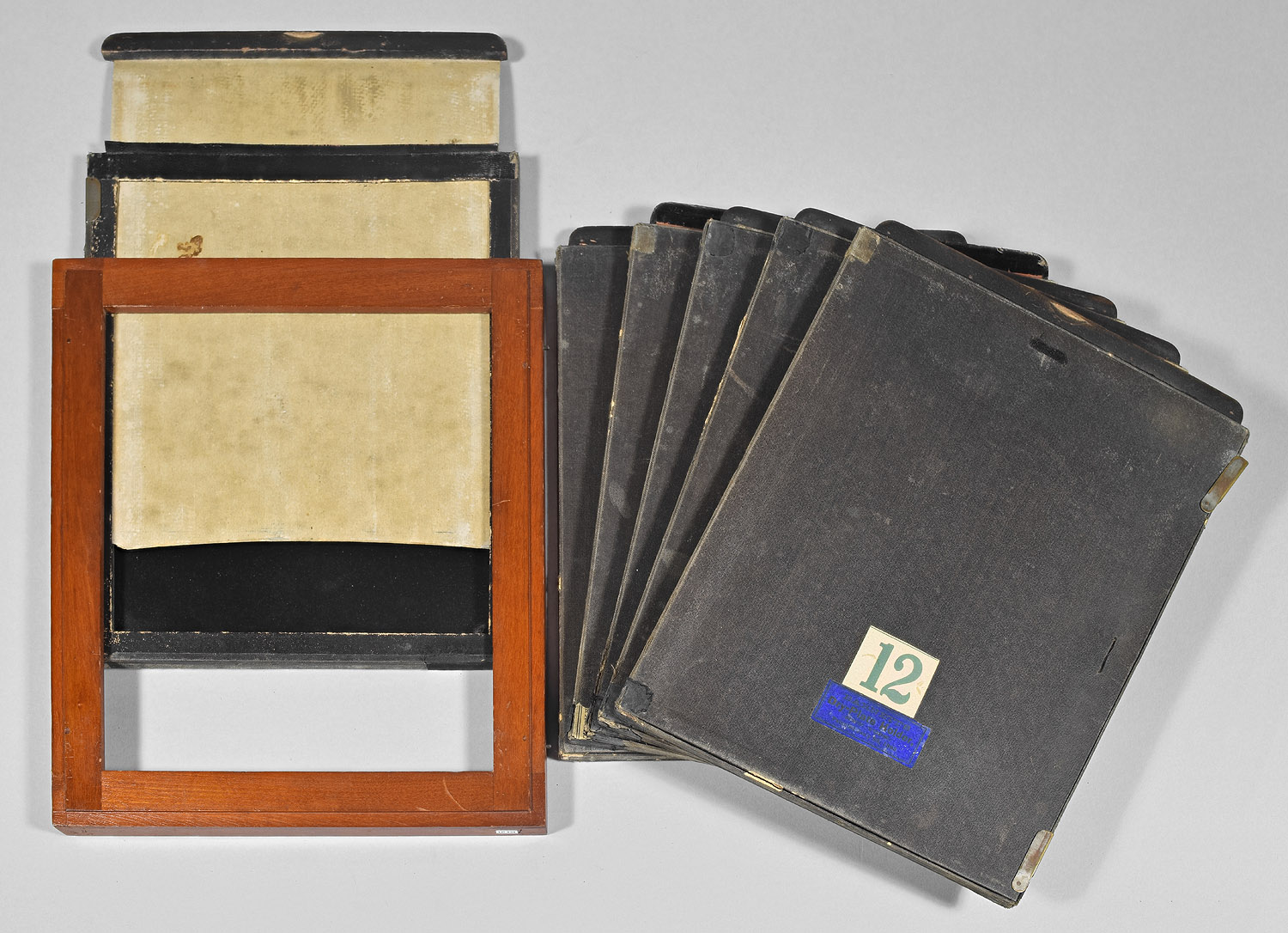
Top: "11", a large number to tell it apart from other holders.
Bottom: "Barnett's - Dry-Plate Holder, - New York - Patented Jan'y
30, 1883"
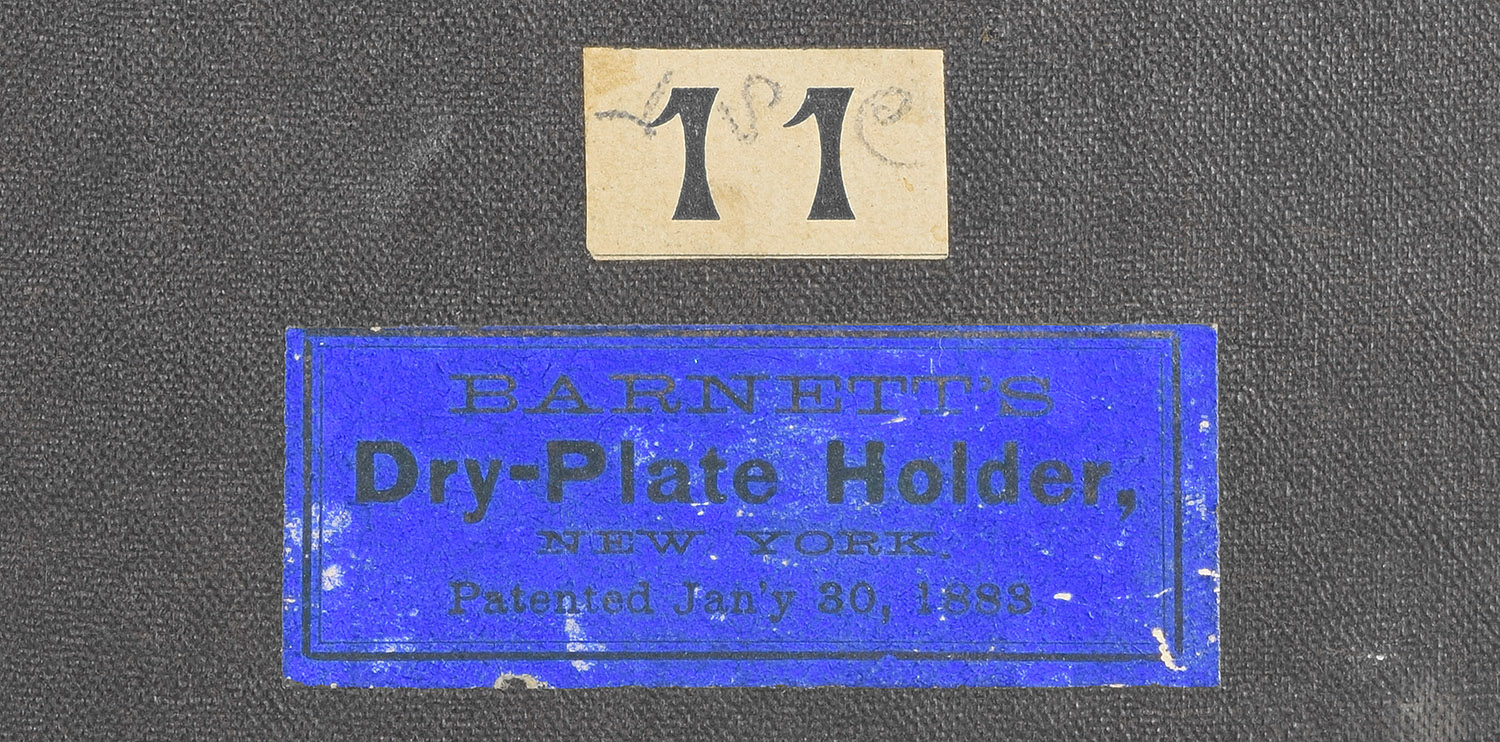
Construction: back focus
via push-pull; single or no swing; three-piece lens
board; non-reversing; ground glass frame hinges down
Materials: cherry body; cherry bed; brown
(photos) leatherette bellows;
nickeled brass hardware; varnish finish
Sizes Offered: 3 ½x4 ½; 4x5; 4 ½x6 ½;
5x7; 5x8; 6 ½x8 ½; 8x10
Notes:
Wood: Cherry throughout,
rich reddish-orange color.
Wood: Highly figured mahogany
body; cherry bed, rich reddish-orange color, like Variation 1.
Wood: Highly figured mahogany
body; cherry bed, stained walnutty dark.
Wood: Cherry throughout,
light orange.
Wood: Cherry throughout,
light orange (LP1268 has a dark patina, but probably started out light
orange).
Wood: Cherry throughout,
light orange.
This variation is the most common of all the New Model
variations.
